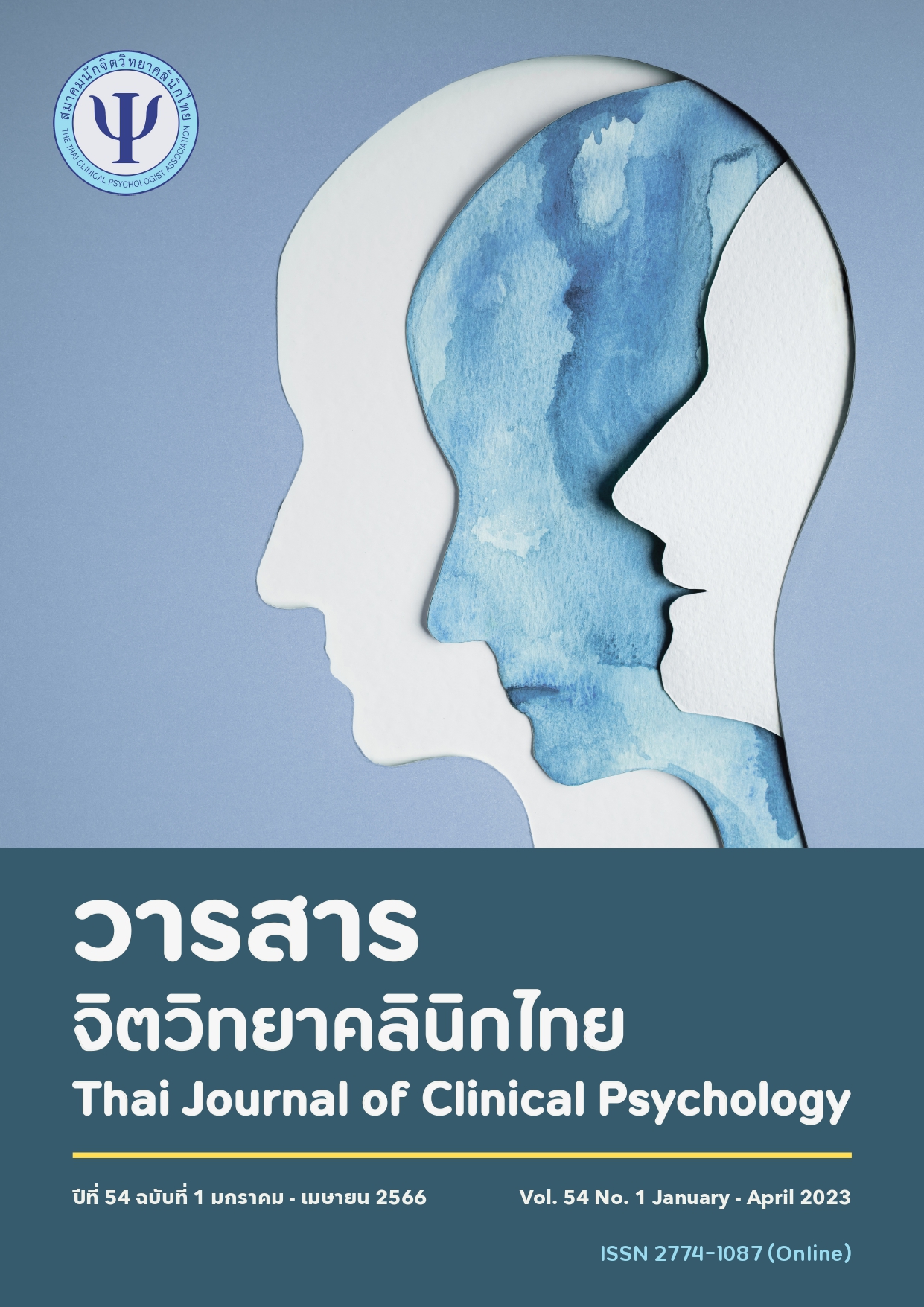Satir Family Counseling Guideline for High Expressed Emotion Families
Main Article Content
Abstract
This article aims to present the satir family counseling guideline for high expressed emotion (HEE) families. The content consists of expressed emotion concepts, satir family counseling concepts, goals of family counseling, family counseling techniques, family counseling approach guidelines, and advice to the counselors and research. The authors hope that this article will be a benefit to the counselor by bringing it to reduce the high expressed emotion in families which affect family members expressed emotion toward others for example verbal and non-verbal showing emotion and attitude to them. It set up a good relationship with each other.
Article Details

This work is licensed under a Creative Commons Attribution-NonCommercial-NoDerivatives 4.0 International License.
เรื่องที่ลงตีพิมพ์ในวารสารจิตวิทยาคลินิกแล้วถือเป็นลิขสิทธิ์การเผยแพร่โดยวารสารจิตวิทยาคลินิกแต่เพียงผู้เดียว การตีพิมพ์หรือเผยแพร่ซ้ำในที่อื่นต้องได้รับอนุญาตจากกองบรรณาธิการวารสารฯ
References
Anchuen, K., Luenthaisong, W., Wongchampa, W., Jinarat, J., & Patipatpakdee, H. (2020). The effective of family therapy based on Satir model according to the life congruence and the level of depression of patients with major depressive disorders admitted in the hospital. Journal of Department of Health Service Support. 16(1), 56-66. (in Thai).
Banmen, J. & Maki-Banmen, K. (2022, May 01). Satir transformational systemic therapy (in brief). http://www.satirpacific.org/uploads/documents/Satir%20Transformational%20Systemic%20Therapy%20in%20Brief
Butzlaff, R. L., & Hooley, J. M. (1998). Expressed emotion and psychiatric relapse, a meta-analysis. Archives of General Psychiatry, 55, 547-552. https://doi:10.1001/archpsyc.55.6.547
Charuchinda, W. (2019). Satir family counseling according to buddhist psychology. Journal of Buddhist Psychology, 4(2), 1-12. https://so03.tci-thaijo.org/index.php/jbp/article /view/243007 (in Thai).
Delvecchio, E., Riso, D. D., Chessa, D., Salcuni, S., Mazzeschi, C., & Laghezza, L. (2014). Expressed emotion, parental stress, and family dysfunction among parents of nonclinical Italian children. J Child Fam Stud, 23, 989–999. https://doi:10.1007/s10826-013-9754-x
Fahrer, J., Brill, N., Dobener, L. M., Asbrand, J., & Christiansen, H. (2022). Expressed emotion in the family: A meta-analytic review of expressed emotion as a mechanism of the transgenerational transmission of mental disorders. Frontiers in Psychiatry, 12, 1-14. https://doi.org/10.3389/fpsyt.2021.721796
Friends International Thailand. (2018). Child abuse report in community area 2018. Friends International Thailand.
Green, S. & Baker, B. (2011). Parents’ emotion expression as a predictor of child’s social competence: Children with or without intellectual disability. Journal of Intellectual Disability Research, 55(3), 324-338. https://doi.org/10.1111/j.1365-2788.2010.01363.x
Hooley, J. M. (2007). Expressed emotion and relapse of psychopathology. Annual Review of Clinical Psychology, 3, 329–352. https://doi.org/10.1146/annurev.clinpsy.2.022305.095236
Jenkins, J. N., & Karno, M. (1992). The meaning of expressed emotion: Theoretical issues raised by cross-cultural research. American Journal of Psychiatry, 149(1), 9-21. https://psycnet.apa.org/doi/10.1176/ajp.149.1.9
Kavanagh, D. J. (1992). Recent developments in expressed emotions and schizophrenia. The British Journal of Psychiatry, 160, 601–620. https://doi:10.1192/bjp.160.5.601.PMID:1591571
Koomsubanan, S. (2010). Family counseling handbook for child development and cognitive practitioners. (2nd ed.). Bangkok: Beyond publishing. (in Thai).
Kulnapadol, P. (2017). Family counseling. Han compute offset. (in Thai).
Le Grange, D., Hoste, R. R., Lock, J., & Bryson, S. W. (2011). Parental expressed emotion of adolescents with anorexia nervosa: Outcome in family-based treatment. International Journal of Eating Disorders, 44, 731–734. doi:10.1002/eat.20877.Epub 2010Nov10.PMID:22072411;PMCID:PMC3117016
Limsuwan, N., & Limsuwan, N. (2012). Psychotheraphy using Satir model. Journal of The Psychiatric Association of Thailand, 52(3), 251-258. https://www.psychiatry.or.th/ /JOURNAL/57-3/01-Nongpanga. (in Thai).
Marom, S., Munitz. H., Jones, P. B., Weizman, A., & Hermesh, H. (2005). Expressed emotion: Relevance to rehospitalization in schizophrenia over 7 years. Schizophrenia Bulletin, 31(3), 751-758. https://doi.org/10.1093/schbul/sbi016
Naipinit, A., Kroeksakul, P., & Promsaka Na Sakolnakorn, T. (2014). Adjustment under globalization. SKRU Academic Journal, 7(1), 1-12. (in Thai).
Okur, S. (2020). Satir transformational systemic therapy and spirituality. Spiritual Psychology and Counseling, 5, 45–64. https://dx.doi.org/10.37898/spc.2020.5.1.094
Parapleewan, P. (2019). From consumption as activity to consumer culture as theory. Journal of Journalism, 12(3), 106-141. (in Thai).
Phetsri, S., Srimeechai, S., & Le Mouellic, C. (2013). Satir family therapy with parental’s mental process study to reduce violence against children. Academic seminar due to establishment of faculty of Social Administration, Thamasat University 65. (pp. 179-193). https://anyflip.com/ wabr/vshh. (in Thai).
Sapanan, S. (2018). Family group therapy. Thammasat University. (in Thai).
Singkorn, O., Seeherunwong, A., Kanjanakaroon, R., & Panyadee, W. (2016). The effect of psychoeducational group program based on Satir’s model on depressive symptoms in Thai woman with major depressive disorders. The Journal of Psychiatric Nursing and Mental Health, 30(3), 21-35. (in Thai).
Siripat, M. & Unipanthu, J. (2018). The effective of coping group program on expressed emotion of schizophrenic patients’ caregivers. Nursing Science Journal of Thailand Chulalongkorn University, 30(3), 78 – 90. https://he01.tci-thaijo.org/index.php/CUNS /article/view/200518 (in Thai).
Srikosai, S., Dornnork, P., Taweewattanaprecha, S., & Saipanish, R. (2018). Clinical outcomes and parents’ life congruence of children with attention deficit-hyperactive disorder after Satir model based psychoeducational program. Journal of The Psychiatric Association of Thailand, 63(3), 227-246. https://he01.tci-thaijo.org/index.php/JPAT/article/view/147983. (in Thai).
Sukhonthapirom, P. (1990). Opinions on psychiatry and behavioral sciences. Chulalongkorn University. (in Thai).
Sukhothai Dhammadiraj University. (2013). Introduction to techniques of counseling. Sukhothai Dhammadiraj University printing. (in Thai).
Trangkasombat, (2020). New life creation, psychotherapy and counseling: Humanistic – existential experiential. (5th ed.). Sunta publishing. (in Thai).
Wongpiromsarn, Y. (2016). Mindfulness-based therapy and counseling (MBTC). Beyond publishing. (in Thai)


